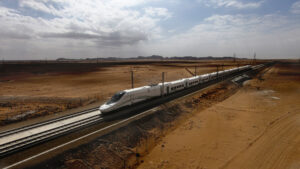Photo: Consorcio Español Alta Velocidad Meca Medina
The technology analyses in real time images from thermal infrared cameras installed along the 453-kilometre route
The centre provides technology to improve the security of the infrastructure
The software developed by Gradiant will help to monitor the high-speed railway line between Mecca and Medina (Saudi Arabia) until 2031 by using video analytics technology, which is integrated into the security system developed by the Spanish company Indra, one of the leading global technology and consulting companies, and technological partner of the Haramain project. Gradiant’s technology, integrated in a complex surveillance system, analyses the images collected by the thermal infrared cameras deployed along the 453 kilometres of the railroad between Mecca and Medina.
The surveillance is based on an artificial intelligence (AI) and computer vision system, developed by Gradiant, which automatically processes the images and immediately sends an alert signal to the control centre in the event of any incident on the railway. This system detects and warns, for example, about the presence of vehicles, people or animals approaching the railway infrastructure.
Gradiant has been working on this development since 2019, with the participation of a team of 10 experts made up of telecommunications engineers, computer scientists and physicists. The first phase of system validation was successfully completed at the end of 2020. The full installation will be completed in the coming months.
The extreme conditions of the desert, with temperatures reaching 50 degrees Celsius and constant sandstorms, require reliable and robust technology to ensure its operation, both day and night and in all weather conditions.
The Haramain high-speed train restarted commercial travels on the entire line between Mecca and Medina by end of March, with stops at Jeddah’s airport (King Abdulaziz International Airport) and Kaec’s airport (King Abdullah Economic City), which had been suspended since March 21st, 2020, due to the covid-19 pandemic. Built by the Spanish-Saudi consortium Al Shoula, the high-speed line between Mecca and Medina is the first infrastructure of its kind to operate in a desert environment.
As the project’s technology partner, Indra is the company responsible for the control centres (railway management and operation support systems and consortium management systems), communications (fixed and mobile), security (CCTV, access control and fire detection), the passenger information system, reservation management systems and ticket sales.
Since its entry into service on October 11th, 2018, until last September, the line has been used by more than 1.5 million passengers. The average punctuality rate exceeds 9
340 innovative projects in more than 30 countries
Gradiant’s video analysis technology is applied in different surveillance and monitoring scenarios in open spaces, such as gauging control on beaches or bird monitoring in the vicinity of wind farms.
Gradiant has completed in its 13 years of activity more than 340 projects for sectors such as aerospace, cybersecurity or health and wellbeing. The innovative solutions developed by Gradiant, have already been implemented in more than 370 companies in 30 different countries.



